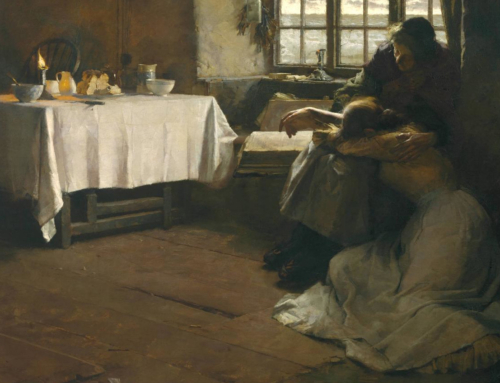I think that Lin-Manuel Miranda’s “It’s Quiet Uptown” from the musical Hamilton is the best recent artistic expression of the inexpressible quality of human suffering. It is a powerful piece of music and poetry. Therefore, I want to let it sing for itself (listen to it here). I offer, by way of commentary on key lyrics, my reflections upon the song’s central insights.
(Narrator) There are moments that the words don’t reach
There is suffering too terrible to name
You hold your child as tight as you can
And push away the unimaginable
The moments when you’re in so deep
It feels easier to just swim down
(Chorus) The Hamiltons move uptown
And learn to live with the unimaginable
Alexander and Eliza Hamilton just lost their son, Philip, who died in a duel defending his father’s honor. Further, Alexander was recently unfaithful to Eliza, straining their marriage bond. They now must learn to live anew. By narrating their story, the song points to the mystery of evil, which so confuses us it’s hard to utter; it appears so dark that our minds, made for light, can’t hold on to it. Evil is so difficult to fathom that it tempts one to be swept down by it into a dark, unimaginable despair. Yet at this moment, the song offers hope by speaking to the action of its protagonists—who move uptown, against the evil current.
(Alexander) I spend hours in the garden
I walk alone to the store
And it’s quiet uptown
I never liked the quiet before
I take the children to church on Sunday
A sign of the cross at the door
And I pray
That never used to happen before
Alexander is changed by his suffering, doing what he’d never done before. Solitude and quiet, previously unattractive to him, now seem soothing. He seeks in them a refuge. This may strike us as strange, since the more instinctive reaction would be to seek escape in busyness and noise, to drown out the terror of pain. But Alexander chooses a wiser way—to let his suffering be and to meet it as we all at first do, alone and in silence. Only then, by another mystery of silent and solitary suffering, is he moved to pray.
(Alexander) Philip, you would like it uptown, it’s quiet uptown
When Alexander sings again, he speaks to his dead son. He longs for his presence and desires to share the treasured quiet he has discovered. It is not good for man to be alone, he needs the company of those he loves.
(Alexander) I know I don’t deserve you, Eliza
But hear me out
That would be enough
If I could spare his life
If I could trade his life for mine
He’d be standing here right now
And you would smile, and that would be enough
I don’t pretend to know
The challenges we’re facing
I know there’s no replacing what we’ve lost
And you need time
But I’m not afraid
I know who I married
Just let me stay here by your side
That would be enough
Alexander, now accompanied by his wife, speaks to her and attempts reconciliation. He wishes he could bring Philip back to life, even sacrificing his own life. He wants Eliza to be happy, and her happiness would suffice for his own. Yet he knows he can’t fix the suffering. He only asks for her presence and her love, of which he knows himself unworthy.
(Alexander) Eliza, do you like it uptown? It’s quiet uptown
(Chorus) He is trying to do the unimaginable …
They are trying to do the unimaginable
Alexander’s earlier hope to share the quiet with Philip now becomes an invitation to Eliza who can be present to him here and now. It represents Alexander’s olive branch to his wife. It is his attempt, rather, their shared attempt at bridging the gap of unspeakable woundedness that has divided them.
(Narrator) There are moments that the words don’t reach
There is a grace too powerful to name
We push away what we can never understand
We push away the unimaginable
The song echoes its opening words. But here it points to the mystery of grace, which so dazzles us it’s hard to utter; it appears so brilliant that our minds, accustomed to lesser lights, can’t hold on to it. We resist this mystery, not because it’s too dark but because we do not allow ourselves to believe in luminous, unimaginable goodness. At this moment in their story, another moment that words don’t reach, Alexander and Eliza face a choice.
(Narrator) They are standing in the garden
Alexander by Eliza’s side
She takes his hand
(Eliza) It’s quiet uptown
Eliza now, for the one time in the song, takes the initiative. She grabs Alexander’s hand, accepting his olive branch. And she speaks a peace-full word, barely breaking the silence. She acts, moved by grace, to do the unimaginable.
(Chorus) Forgiveness
Can you imagine?
Forgiveness
Can you imagine?
Immediately, the chorus breaks into song, giving a name, “forgiveness,” to that wonderful fruit of grace in the spouses’ lives. We are left speechless and the chorus questions us. It asks: Can you believe this is possible? Did they, can we, truly forgive?
If you see him in the street, walking by her side
Talking by her side, have pity
They are going through the unimaginable
The song ends with a journey unfinished. Alexander and Eliza are still walking and talking, still going through the interplay between unimaginable suffering and the unimaginable grace that alone can heal. When we see them and those like them, will we have pity?
✠
Image: Onderdonk, Autumn Birches, Central Park







